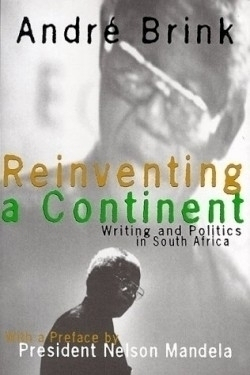Reinventing a Continent
Writing and Politics in South Africa
South Africa is a land of perpetual paradox. A dysfunctional family, its peoples—black, white, mixed, and East Indian—have such strong identities that the country has been unable to tell the world just what a South African is.
Andre Brink, a South African novelist, switches his gaze from fiction (2 novels) to cultural affairs in Reinventing a Continent. It is a collection of 17 essays, which chronicle the enormous social changes of the past 15 years.
Brink looks back at the often desolate, often hopeless, always bloody South African cultural battlefield, and yet sees the flowers of hope, the iron ore of human resolve. With an artist’s alchemy, he dips his pen and turns blood into beauty. A cynic might say the beautiful carnage is literary genius.
Brink makes no effort to explain his country in conventional terms. Rather, his essays focus on how writers, poets, journalists and artists have impacted “the existence of black and white in a variety of relationships—as masters and servants, as antagonists; as rivals, as collaborators, as friends, as human beings.”
Who else but Nelson Mandela would Brink ask to write an introduction to his timely and revealing book? In it, Mandela says that “the tyranny of silence” imposed for so long by the Afrikaner minority rulers, in the end, was no match for the “voices of justice and reason.” Voices that came from South Africans of all ethnic backgrounds and shades.
In one of the most revealing chapters, “Speaking in Voices,” Brink finds himself in a racist society where “people (are) reaching out and touching across all artificially imposed barriers, as colleagues or acquaintances, in a few precious cases, as real and lasting friends.”
Brink’s other key chapter is “Afrikaners,” in which he unpeels the stubborn white Dutchman, who sees himself as one of those chosen by God to keep the distinct faith.
He quotes William de Klerk, deposed editor of the Afrikaans-language newspaper, Rapport: “The Afrikaner is bursting out of his definitions of himself as well as those of others.”
Brink finds that “a deep current of goodwill” runs between even the most intransigent extremes in South Africa. “And since their very intransigence stems from the same attachment to the territory, this in itself may paradoxically turn out to be a source of hope rather of despair.”
Reviewed by
David Hacker
Disclosure: This article is not an endorsement, but a review. The publisher of this book provided free copies of the book to have their book reviewed by a professional reviewer. No fee was paid by the publisher for this review. Foreword Reviews only recommends books that we love. Foreword Magazine, Inc. is disclosing this in accordance with the Federal Trade Commission’s 16 CFR, Part 255.

